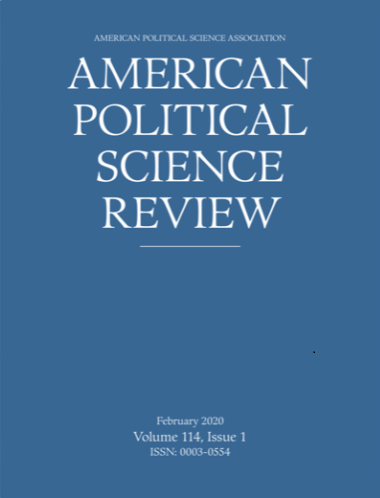不要愤怒地回头看:在相互矛盾的历史叙述中开展合作
IF 5.8
1区 社会学
Q1 POLITICAL SCIENCE
引用次数: 0
摘要
冲突中的国家往往对过去有着不同的解释。它们相互指责对方挑起了冲突,并认为自己的行为是合理的报复,这使它们不愿合作。这种现象虽然在国际关系中很常见,但现有的正式合作理论并不能很好地理解它。在 "重复囚徒困境"(Repeated Prisoner's Dilemma)框架下,我们证明了要求对过去的错误行为进行赎罪的策略会比不要求赎罪的策略表现更好。当对过去的认知存在分歧时,后者能够更快地摆脱报复性循环,并恢复合作。最后,我们以中美两国对 1989 年天安门抗议活动的反应为例进行分析。中美两国对天安门起义的起因和中方反应的合法性存在强烈分歧,但在经过一段有限的相互惩罚之后,双方又恢复了合作。本文章由计算机程序翻译,如有差异,请以英文原文为准。
Don’t Look Back in Anger: Cooperation Despite Conflicting Historical Narratives
States in conflict often have divergent interpretations of the past. They blame each other for starting the conflict and view their own actions as justified retaliation, which makes them reluctant to cooperate. This phenomenon, while common in international relations, is not well understood by existing formal theories of cooperation. In the context of the Repeated Prisoner’s Dilemma framework, we show that strategies that demand atonement for past misdeeds are outperformed by strategies that do not. The latter are able to get out of retaliatory cycles and return to cooperation more quickly when there are divergent perceptions of the past. We conclude with a case study of Chinese and U.S. responses to the Tiananmen protests of 1989. China and the United States strongly disagree about the cause of the Tiananmen uprising and the legitimacy of the Chinese response, but nevertheless returned to cooperation after a limited period of mutual punishment.
求助全文
通过发布文献求助,成功后即可免费获取论文全文。
去求助
来源期刊

American Political Science Review
POLITICAL SCIENCE-
CiteScore
9.80
自引率
5.90%
发文量
119
期刊介绍:
American Political Science Review is political science''s premier scholarly research journal, providing peer-reviewed articles and review essays from subfields throughout the discipline. Areas covered include political theory, American politics, public policy, public administration, comparative politics, and international relations. APSR has published continuously since 1906. American Political Science Review is sold ONLY as part of a joint subscription with Perspectives on Politics and PS: Political Science & Politics.
 求助内容:
求助内容: 应助结果提醒方式:
应助结果提醒方式:


